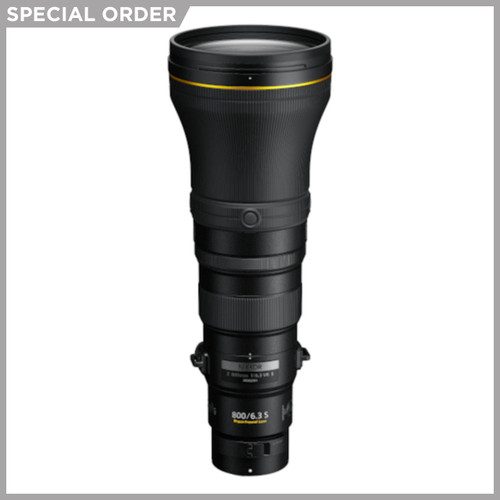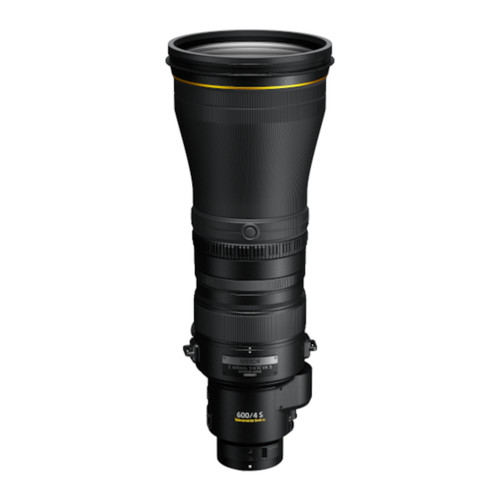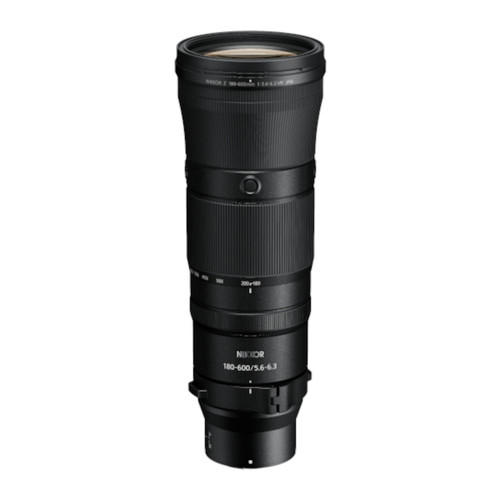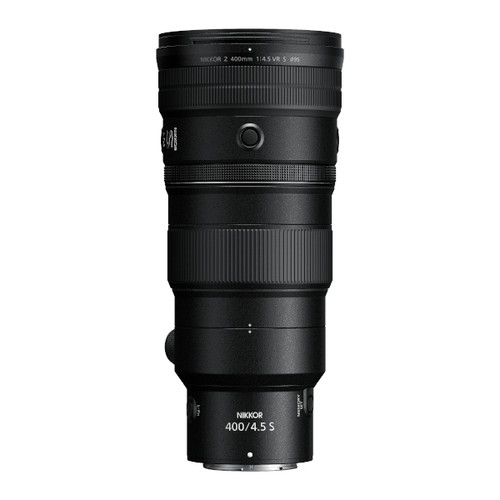Videos Hide Videos Show Videos
Product Description
Minimized size.
Maximized reach.
A handheld 600mm prime in a class of its own.
Pack lighter, react faster and cover more distance with the shortest, lightest 600mm prime lens Nikon has ever created. Designed around a size-reducing Phase Fresnel (PF) lens element, the NIKKOR Z 600mm f/6.3 VR S enables bird, wildlife, motorsports and aircraft photographers to perform in the field with tremendous mobility and spontaneity.
- S-Line
- Premium Optics
- 600mm
- Super-Telephoto Prime
- 1390g
- Lightweight¹
- PF
- Phase Fresnel
- Element
- VR
- Image Stabilization
- (6.0 stops)²
- Z Mount
- Full-Frame/FX Format
So much power in your hands.
Leave the tripod and monopod at home and live in the moment, quickly acquiring faraway subjects and tracking them with controlled precision.
Just 11 inches long and 3 pounds.
The NIKKOR Z 600mm f/6.3 VR S fits comfortably in most backpacks and carry-on luggage, and it's light enough to be shot all day with less fatigue.
Outstanding balance & handling.
The center of gravity is shifted toward the camera, giving you more speed and control when panning and making the lens feel even lighter.
600mm draws you in.
An essential focal length for motorsport action, birds and wildlife, 600mm closes vast distances and brings the heart of the story to your viewfinder.
Get even closer.
Add an optional Z series teleconverter and extend your view up to 1200mm. Switch to DX Crop Mode in-camera for an additional 1.5x boost to your angle of view.
Stunning clarity down to the smallest detail.
Specialized ED and SR lens elements work together to prevent light dispersion and produce the sharpest images imaginable. Fine details and intricate patterns, like those found in the feathers of birds, are rendered with lifelike accuracy.
Cut through backlighting and glare.
Nikon's anti-reflection coating, Nano Crystal Coat (N), greatly reduces ghosting and flare, even against bright backgrounds with direct sunlight.
Fast, reliable autofocus.
The NIKKOR Z 600mm f/6.3 VR S lens is powered by the Nikon Stepping Motor (STM), an incredibly accurate, near-silent AF drive system designed to keep up with fast, erratic subjects like birds and motorsports, where you have only an instant to nail the shot.
Up to 6.0 stops of VR.
Built-in optical VR achieves an effect of shooting up to 6.0 stops* faster on a camera that supports Synchro VR and 5.5 stops* faster on all other Z series cameras.
*Based on CIPA Standard; in NORMAL mode; this value is achieved when attached to a mirrorless camera equipped with a 35mm film size image sensor.
Versatile video performance.
The NIKKOR Z 600mm f/6.3 VR S lens operates with virtually no mechanical noise, so you can confidently use Continuous AF to track subjects. Focus breathing is heavily suppressed, maintaining your framing as your focus position changes. And the precision electromagnetic diaphragm lets you make smooth, stepless aperture adjustments while recording.
Nothing holding you back.
Advanced weather sealing.
Rubber gaskets keep dust, dirt and moisture out of moving parts, including the lens mount.
*Perfect dustproof and waterproof performance is not guaranteed under all conditions.
Recall stored focus positions.
Save a focus position with the Memory Set button. As your subject approaches the decisive moment, instantly snap back to that saved position using the Fn or Fn2 buttons.
Nonstick protective coating.
The front element has Nikon’s nonstick Fluorine Coat, which repels oil, moisture and smudges and easily wipes clean.
The S-Line advantage.
At the top of the NIKKOR Z lineup are special lenses developed in pursuit of a higher level of optical performance—lenses that push the boundaries of traditional design, meet a higher standard of quality and enable new forms of image creation.
Form meets function.
Screw-on filters.
Uses standard 95mm threaded circular filters.
Assignable control ring.
Smooth and clickless, use it to adjust aperture, ISO, exposure compensation and more.
Assignable L-Fn buttons.
Map them to subject tracking, AF Lock, image playback and more. For convenient reach, L-Fn2 is available from four separate locations around the lens barrel.
Kensington Security Slot.
Compatible with pro-grade cable locks to keep your camera safe and secure in remote shooting situations.
Focus limit switch.
Activate to ignore foreground elements closer than 10 meters.
Quick-release tripod foot.
Rotate the lens from landscape to portrait. Quickly release the foot for handheld shooting.
1 Lens weighs approx. 1,390g excluding the tripod collar and approx. 1,470g including the tripod collar.
2 Built-in optical VR achieves an effect of shooting up to 6.0 stops* faster on a camera that supports Synchro VR and 5.5 stops* faster on all other Z series cameras.
*Based on CIPA Standard; in NORMAL mode; this value is achieved when attached to a mirrorless camera equipped with a 35mm film size image sensor.
Technology
ED (Extra-Low Dispersion) Glass
An optical glass developed by Nikon that is used with normal optical glass in telephoto lenses to obtain optimum correction of chromatic aberrations.
Short-Wavelength Refractive Lens
SR is a high- and specialized-dispersion glass lens that refracts light with wavelengths shorter than that of blue. By controlling short-wavelength light, the lens is able to achieve highly precise chromatic aberration compensation so that the colours in your images are more accurately reproduced. It also allows for more flexible optical designs, which allows for compact, lighter lenses to be designed.
Phase Fresnel
Phase Fresnel (PF) lens elements effectively compensate for chromatic aberration and ghosting when combined with ordinary glass lens elements. The PF lens element is based upon the Phase Fresnel lens, which appears to have a series of concentric circles engraved onto it. Utilizing a Phase Fresnel lens element allows Nikon engineers to use fewer lens elements, resulting in a more compact and lightweight lens. Due to the characteristics of a PF (Phase Fresnel) lens that utilizes the photo diffraction phenomenon, when there is a strong light source within the frame or when light enters the lens from outside of the frame, ring-shaped coloured flare may occur according to shooting conditions. This phenomenon can be minimized with “PF Flare Control” to be included in Capture NX-D (ver.1.1.0 or later). For more information, see software Help/manual. Capture NX-D is available from the Nikon website. Be sure to keep your software up to date.
A/M
A/M stands for Auto-Priority Manual Mode. This mode also enables an easy transition from autofocus to manual during AF operation. However, mode switch sensitivity has been altered to reduce the possibility of sudden unintentional switching to manual focus while shooting.
Nano Crystal Coat
An anti-reflective coating developed by Nikon that virtually eliminates internal lens element reflections across a wide range of wavelengths. Nano Crystal Coat solves ghost effects caused by red light and effectively reduces ghost and flare caused by light entering the lens diagonally.
Fluorine Coat
Photographers need gear that can withstand the elements. Nikon’s fluorine coat effectively repels dust, water droplets, grease or dirt, ensuring easy removal even when they adhere to the lens surface. Nikon’s fluorine coat endures a high frequency of lens surface wiping and its anti-reflective effect also contributes to the capture of clear images.
Vibration Reduction
A Nikon in-lens technology that improves image stability by automatically compensating for camera shake. Lenses that offer VR will feature the abbreviation VR on the lens barrel.
Electromagnetic Diaphragm Mechanism
An electromagnetic diaphragm mechanism in the lens barrel provides highly accurate electronic diaphragm or aperture blade control when using auto exposure during continuous shooting.
Stepping Motor
NIKKOR Z lenses use a stepping motor for fast, accurate, smooth, quiet autofocus with reduced wobbling. This quiet drive system makes the lenses ideal for use when shooting video.
IF Lens
A NIKKOR lens in which only the internal lens group shifts during focusing. Thus, IF NIKKORS do not change in size during AF operation, allowing for compact, lightweight lenses capable of closer focusing distances. These lenses will be designated with the abbreviation IF on the lens barrel.
20231011JH
Additional Details
| Bonus | 20122 |
|---|---|
| Available for Special Order | Final sale: No returns/exchanges |



















